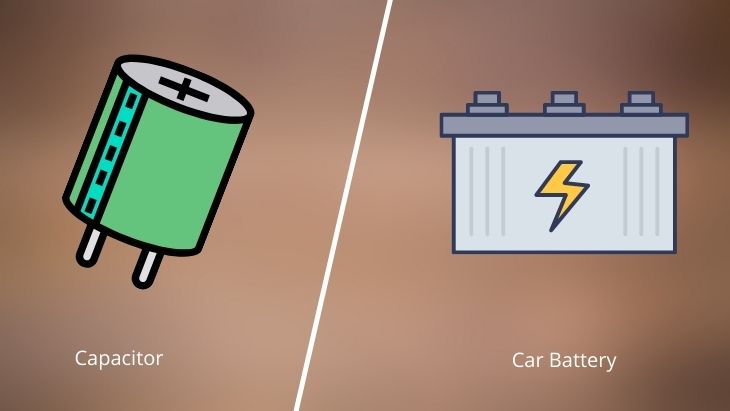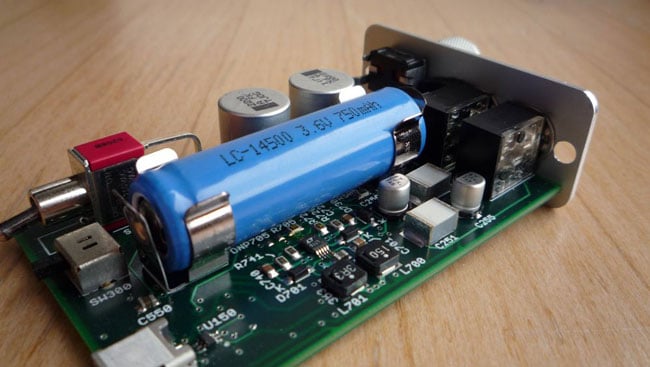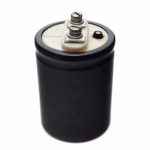Oftentimes, car audio capacitors are discussed when looking for solutions to the issue of car headlights dimming when the audio system’s volume and bass are turned all the way up.
You are considering installing a capacitor and might be wondering:
How well does a capacitor solve the problem of dimming car lights?
Is this all that a capacitor can do?
And can you still use a cap even if your car lights are not dimming?
Our team has been researching this topic with an aim of providing insight into the workings of capacitors in a car electrical system. In the next few minutes, let’s get to know what a cap can and cannot do for a car audio system.
What is a capacitor and how does it work?
A power capacitor, in short, a cap, is a non-powered device for temporary storage of electrical power. It has a simple design consisting of two electrical conductors (metallic plates) and a dielectric (non-conductor) separating them.
When the cap is connected to a source of voltage, the non-conductor stops voltage flow between the conductors. A static electric field is created between the plates, resulting into the buildup of charge. This current rapidly discharges when the cap is connected to an external circuit. Each capacitor has a particular capacitance – the maximum amount of energy it can store.
Power caps are built to store and discharge power quickly. In car audio applications, this particular ability is utilized to provide on-demand power to various components of the audio system, especially the amplifier.
Apart from application in car audio systems, capacitors have varying uses in other types of electronics. In fact, almost any electronic device contains capacitors – from small portable music devices that use small caps to heart defibrillators and lasers that use very big caps. The key reason for including caps in an electric system is their ability to provide a great deal of power in very short periods.
How different is a Capacitor from a Car Battery?

Capacitors and batteries perform a similar function of energy storage and discharge. However, they differ in several ways, in design and in function. A capacitor stores potential energy in an electric field while a battery stores energy in chemical form. While the technology for chemical storage allows batteries to have a greater energy density, latency in the process of converting chemical energy to electrical energy makes the process of energy discharge slower in batteries compared to capacitors. Also, capacitors have low internal resistance than batteries.
These reasons explain why a cap can deliver large amounts of current very quickly, something that a battery cannot do.
What a cap can do for a car audio system
i. Stabilizing the voltage to the amplifier
Car audio systems with large wattage or multiple amplifiers present large current demands to the car’s electrical system. Depending on the music being played, the amp(s) may need short energy bursts especially during transient peaks. An attempt to draw this current directly from the electrical system may cause a significant drop in voltage – commonly known as voltage sag. This sag is dependent on the resistance of the wire connecting the power source (battery) and the amp.
Adding a capacitor can help to solve his issue. During normal operation, the car’s electrical system provides voltage to the cap and charges it up. If and when the amp tries to get more current from the electrical system than the system can put out, the cap is at standby to discharge and provide the additional energy required, thus preventing voltage sag.
To perform efficiently, car capacitors are usually installed as close as possible to the amplifier. This placement ensures that the voltage drop is minimized so that the entire electrical system continues to perform normally.
ii. Helps the amplifier to run cooler and more efficiently
One of the benefits of stabilizing the voltage to the amplifier is more efficiency on the part of the amp. The cap charges and discharges very fast, and this property enables it to step in at the right moment – just when the amp is about to strain to fulfill the audio system’s overwhelming power needs. With the extra burden lifted, the amplifier is able to stay cooler for longer periods. More importantly, it runs more efficiently and gives its best to the sound system.
iii. Prevent your music from weakening and flattening
As the amp is supported to produce power more consistently, there is less distortion of audio. This partly explains why capacitors are associated with improved transient response of subwoofers. They help the amp deliver better output even during bass peaks. In other words, a cap prevents your music from weakening and flattening when you are playing heavy notes loudly.
iv. Keep your headlights from dimming

Dimming lights is one of the visual confirmations of voltage sag. Since a cap prevents your amplifier from drawing large current amounts abruptly from the electrical system, you’ll experience reduced instances of car light dimming. This means you can crank up your subs all day and all night while on the go without worrying that something will happen to your lights.
In a nutshell, a capacitor covers up possible voltage inconsistencies as far as its capacitance can allow. It prevents the battery from being overloaded, and the amplifier from being strained. The overall audio effect is that your music does not go flat but rather maintains great dynamic quality for your ultimate enjoyment.
What a cap cannot do
Despite the fact that capacitors can offer great help in solving issues caused by voltage sags, there are some instances where adding a capacitor won’t help much.
- First, if your lights go dim frequently and severely, your main power source might need an upgrade. You may need to install another battery and/or upgrade the alternator.
- Secondly, a capacitor cannot make a car audio system louder. A cap can only improve the efficiency of electrical system and of the amplifier. This consequently improves the performance of the audio system by minimizing potential distortion that may result from sudden drops in power supply.
To ensure that your audio system does not suffer severe effects of power supply inconsistencies, be sure to have battery and alternator power that can provide adequate amperage for the entire electrical system. If the car’s charging system fails to supply enough current consistently, no number of capacitors can keep low voltage issues away from your electrical system. Also, check your wiring to ensure that it is of adequate size. Note that voltage loss can also result from using inadequate wire gauge.
Let’s wrap it up by answering this commonly asked question:
Will a power capacitor help you?
Yes! Adding a cap will help if:
- You have big amplifiers that draw large current amounts. A capacitor offers more benefits to bigger audio systems than to smaller audio systems.
- You like listening to bass heavy music. More likely than not, you are going to experience transient peaks in your music and will find a power cap very useful.
- You love cranking up your subs. Are there some people who still find low-volume music satisfying? Those might not need to supplement their car electrical systems with a capacitor. For you, however, you want your system to reach the highest volume and bass levels. Certainly, you need a power capacitor else you will not fulfill your audio fantasies, and may even damage your audio system if you choose to crank it up without a cap.
- Headlight dimming occurs only when the vehicle is idle. This is an easy indication that a power capacitor is all you need to solve the issue. An idling electrical system puts out much less amperage from the alternator than a fully active system. Add a cap and the dimming will go away indefinitely.
That’s more or less what a capacitor can do for your car audio system. Adding a cap will stabilize voltage to the amplifier, help the amp to operate more efficiently without heating up, improve audio output, and reduce diming of lights. If you are now certain that you need a capacitor, check out our review of some of the best car audio capacitors on the market today.
Michael Evanchuk is a San Francisco-based sound engineer with 20 years’ experience installing, troubleshooting, and repairing commercial, automotive, and household sound equipment. Evanchuk owns an auto stereo center, where he offers highly competitive car audio installation and repair services. He has written dozens of articles on different sound engineering topics, all of which have been published in leading journals, blogs, and websites.





